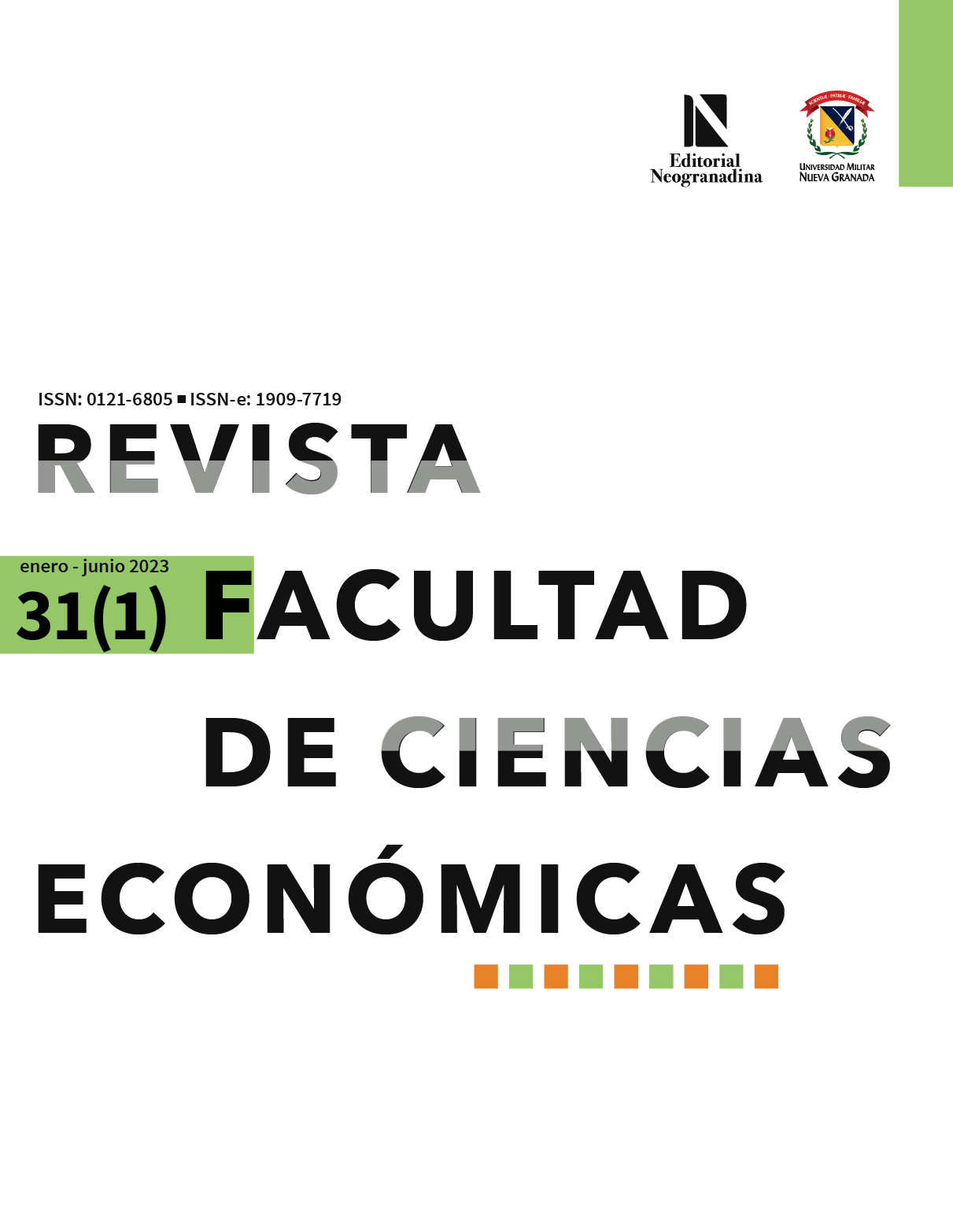Ética ambiental corporativa e innovación verde
estudio de caso comparativo de empresas manufactureras en Colombia
Resumen
Los limites absolutos de crecimiento evidenciados en la actual crisis climática limitan a las compañías en los nuevos escenarios de competitividad. La racionalidad verde corporativa es más exhortada en las cuestiones estratégicas organizacionales. El objetivo de este artículo es realizar un análisis cualitativo que explique comparativamente las relaciones teórico-prácticas halladas sobre los conceptos de la ética ambiental corporativa (EAC) y la innovación verde (IV) en dos empresas manufactureras colombianas. Los resultados empíricos encontraron que ambas compañías conservan una amplia afinidad con las dimensiones teóricas de cada constructo. Sin embargo, existen diferencias entre aspectos de orden metodológico y cultural. En conclusión, la racionalidad verde al interior de las empresas ayuda a la generación de valor agregado, a la imagen corporativa y a lograr mayores niveles de competitividad.
Descargas
Referencias bibliográficas
Abu Seman, N. A., Govindan, K., Mardani, A., Zakuan, N., Mat Saman, M. Z., Hooker, R. E., y Ozkul, S. (2019). The mediating effect of green innovation on the relationship between green supply chain management and environmental performance. Journal of Cleaner Production, 229, 115-127. https://doi.org/10.1016/j.jclepro.2019.03.211
Albort-Morant, G., Henseler, J., Leal-Millán, A., y Cepeda-Carrión, G. (2017). Mapping the field: A bibliometric analysis of green innovation. Sustainability (Switzerland), 9(6), 1-15. https://doi.org/10.3390/su9061011
Augusto, D., Pacheco, D. J., Schwengber, C., Fernando, C., Victorovna, H., y Navas, G. (2018). Eco-innovation determinants in manufacturing SMEs from emerging markets : Systematic literature review and challenges. Journal of Engineering and Technology Management, 48(April), 44-63. https://doi.org/10.1016/j.jengtecman.2018.04.002
Bansal, P. (2005). Evolving sustainably: A longitudinal study of corporate sustainable development. Strategic Management Journal, 26(3), 197-218. https://doi.org/10.1002/smj.441
Ben Arfi, W., Hikkerova, L., y Sahut, J. M. (2018). External knowledge sources, green innovation and performance. Technological Forecasting and Social Change, 129(August 2017), 210-220. https://doi.org/10.1016/j.techfore.2017.09.017
Ben Arfi, W., Hikkerova, L., & Sahut, J. M. (2018a). External knowledge sources, green innovation and performance. Technological Forecasting and Social Change, 129(August 2017), 210-220. https://doi.org/10.1016/j.techfore.2017.09.017
Bisgaard, T., Henriksen, K., y Bjerre, M. (2012). Green Business Model Innovation: Conceptualisation, Next Practice and Policy. In Nordic Innovation Publication. Retrieved from http://www.nordicinnovation.org/publications
Bossle, M. B., Dutra De Barcellos, M., Vieira, L. M., y Sauvée, L. (2016). The drivers for adoption of eco-innovation. Journal of Cleaner Production, 113, 861-872. https://doi.org/10.1016/j.jclepro.2015.11.033
Cai, W. G., y Zhou, X. L. (2014). On the drivers of eco-innovation: Empirical evidence from China. Journal of Cleaner Production, 79, 239-248. https://doi.org/10.1016/j.jclepro.2014.05.035
Cai, W., y Li, G. (2018). The drivers of eco-innovation and its impact on performance : Evidence from China. Journal of Cleaner Production, 176, 110-118. https://doi.org/10.1016/j.jclepro.2017.12.109
Calza, F., Parmentola, A., y Tutore, I. (2017). Types of green innovations: Ways of implementation in a non-green industry. Sustainability (Switzerland), 9(8). https://doi.org/10.3390/su9081301
Chang, C. H. (2011). The Influence of Corporate Environmental Ethics on Competitive Advantage: The Mediation Role of Green Innovation. Journal of Business Ethics. https://doi.org/10.1007/s10551-011-0914-x
Chen, Y. S., Lai, S. B. y Wen, C. T. (2006). The influence of green innovation performance on corporate advantage in Taiwan. Journal of Business Ethics, 67(4), 331-336. https://doi.org/https://doi.org/10.1007/s10551-006-9025-5
Chen, Y. S. y Chang, C. H. (2013). Utilize structural equation modeling (SEM) to explore the influence of corporate environmental ethics: The mediation effect of green human capital. Quality and Quantity, 47(1), 79-95. https://doi.org/10.1007/s11135-011-9504-3
Chiou, T. Y., Chan, H. K., Lettice, F., y Chung, S. H. (2011). The influence of greening the suppliers and green innovation on environmental performance and competitive advantage in Taiwan. Transportation Research Part E: Logistics and Transportation Review, 47(6), 822-836. https://doi.org/10.1016/j.tre.2011.05.016
Costantini, V., y Mazzanti, M. (2012). On the green and innovative side of trade competitiveness? the impact of environmental policies and innovation on EU exports. Research Policy, 41(1), 132-153. https://doi.org/10.1016/j.respol.2011.08.004
Dangelico, R. M. (2015). Improving Firm Environmental Performance and Reputation: The Role of Employee Green Teams. Business Strategy and the Environment, 24(8), 735-749. https://doi.org/10.1002/bse.1842
Dobson, A. (1998). Justice and the environment: Conceptions of environmental sustainability and theories of distributive justice. Oxford/New York: Oxford University Press.
https://doi.org/10.1093/0198294956.001.0001
Eiadat, Y., Kelly, A., Roche, F., y Eyadat, H. (2008). Green and competitive? An empirical test of the mediating role of environmental innovation strategy. Journal of World Business, 43(2), 131-145. https://doi.org/10.1016/j.jwb.2007.11.012
El-Kassar, A. N., & Singh, S. K. (2019). Green innovation and organizational performance: The influence of big data and the moderating role of management commitment and HR practices. Technological Forecasting and Social Change, 144(December), 483-498. https://doi.org/10.1016/j.techfore.2017.12.016
Ferrell, O. C., Harrison, D. E., Ferrell, L., & Hair, J. F. (2019). Business ethics, corporate social responsibility, and brand attitudes: An exploratory study. Journal of Business Research, 95(January), 491-501. https://doi.org/10.1016/j.jbusres.2018.07.039
Foladori, G., & Tommasino, H. (2000). El enfoque técnico y el enfoque social de la sustentabilidad. Revista Paranaense de Desenvolvimento, 98, 67-75.
Freeman, R. E., & York, Jeffrey G, L. S. (2008). Environment, Ethics, and Business. In Business Roundtable Institute for Corporate Ethics. Thought Leader Commentary.
Gallopín, G. C. (2003). A systems approach to sustainability and sustainable development. ECLAC.
Guoyou, Q., Saixing, Z., Chiming, T., Haitao, Y., y Hailiang, Z. (2013). Stakeholders' Influences on Corporate Green Innovation Strategy: A Case Study of Manufacturing Firms in China. Corporate Social Responsibility and Environmental Management, 20(1), 1-14. https://doi.org/10.1002/csr.283
Han, M., Lin, H., Wang, J., Wang, Y., y Jiang, W. (2019). Turning corporate environmental ethics into firm performance: The role of green marketing programs. Business Strategy and the Environment, 28(6), 929-938. https://doi.org/10.1002/bse.2290
He, F., Miao, X., Wong, C. W. Y., & Lee, S. (2018). Contemporary corporate eco-innovation research : A systematic review. Journal of Cleaner Production, 174, 502-526. https://doi.org/10.1016/j.jclepro.2017.10.314
Herrero, L. M. (2002). La sostenibilidad como proceso de equilibrio dinámico y adaptación al cambio. Información Comercial Española, ICE: Revista de Economía., 65-84.
Huang, J. W., y Li, Y. H. (2017). Green Innovation and Performance: The View of Organizational Capability and Social Reciprocity. Journal of Business Ethics.
https://doi.org/10.1007/s10551-0152903-y
Khanra, Sayantan, Kaur, P., Joseph, R. P., Malik, A., & Dhir, A. (2022). A resource-based view of green innovation as a strategic firm resource: Present status and future directions. Business Strategy and the Environment, 31(4), 1395-1413. https://doi.org/10.1002/bse.2961
Lee, K. H., y Min, B. (2015). Green RyD for eco-innovation and its impact on carbon emissions and firm performance. Journal of Cleaner Production, 108, 534-542. https://doi.org/10.1016/j.jclepro.2015.05.114
Leenders, M. A. A. M., y Chandra, Y. (2013). Antecedents and consequences of green innovation in the wine industry: The role of channel structure. Technology Analysis and Strategic Management, 25(2), 203-218. https://doi.org/10.1080/09537325.2012.759203
Lele, S. M. (1991). Suatainable Development: Critical Review. In World Development Vol. 19, Issue 6, pp. 607-621. https://doi.org/10.1016/0305-750X(91)90197-P
Li, G., Wang, X., y Wu, J. (2019). How scientific researchers form green innovation behavior: An empirical analysis of China's enterprises. 56(June 2018), 134-146. https://doi.org/10.1016/j.techsoc.2018.09.012
Liu, J., Wang, H., Ho, H., y Huang, L. (2022). Impact of Heterogeneous Environmental Regulation on Manufacturing Sector Green Transformation and Sustainability. Frontiers in Environmental Science, 10. https://doi.org/10.3389/fenvs.2022.938509
Macedo, B. (2005). El concepto de sostenibilidad. Oficina Regional de Educación Para America Latina y El Caribe-UNESCO, 4.
Nikpour, A. (2017). The impact of organizational culture on organizational performance: The mediating role of employee's organizational commitment. International Journal of Organizational Leadership, 6(1), 65-72. https://doi.org/10.33844/ijol.2017.60432
Norström, A. V., Cvitanovic, C., Löf, M. F., West, S., Wyborn, C., Balvanera, P., &
Österblom, H. (2020). Principles for knowledge co-production in sustainability research. Nature sustainability, 3(3), 182-190. https://doi.org/10.1038/s41893-019-0448-2
Pearce, D. W., & Atkinson, G. D. (2017). Capital theory and the measurement of sustainable development: An indicator of "weak" sustainability. Sustainability, 8, 397-402. https://doi.org/10.4324/9781315241951-34
Perdomo, G. (2012). Análisis del cambio organizacional e institucional. Estudio comparado de dos incubadoras de empresas: "Centro Integral de Servicios Empresariales (CREAME) en Medellin, Colombia (1996- 2010) y Barcelona Activa, Barcelona, España (1986- 2010)." Universidad EAFIT.
Qiu, L., Jie, X., Wang, Y., & Zhao, M. (2020). Green product innovation, green dynamic capability, and competitive advantage: Evidence from Chinese manufacturing enterprises. Corporate Social Responsibility and Environmental Management, 27(1), 146-165. https://doi.org/10.1002/csr.1780
Segarra-Oña, M., Peiró-Signes, A., Miret-Pastor, L., & Albors-Garrigós, J. (2011). Uncovering non-obvious relationship between environmental certification and economic performance at the food industry. Information Technologies in Environmental Engineering: New Trends and Challenges, 325-338. https://doi.org/10.1007/978-3-642-19536-5_26
Schaltegger, S., Lüdeke-Freund, F., y Hansen, E. G. (2012). Business cases for sustainability: The role of business model innovation for corporate sustainability. International Journal of Innovation and Sustainable Development, 6(2), 95-119. https://doi.org/10.1504/IJISD.2012.046944
Schiederig, T., Tietze, F., y Herstatt, C. (2012). Green innovation in technology and innovation management - an exploratory literature review. R and D Management, 42(2), 180-192. https://doi.org/10.1111/j.1467-9310.2011.00672.x
Schuler, D., Rasche, A., Etzion, D., y Newton, L. (2017). Guest Editors' Introduction: Corporate Sustainability Management and Environmental Ethics. Business Ethics Quarterly, 27(2), 213-237. https://doi.org/10.1017/beq.2016.80
Schwartz, M. S. (2005). Universal moral values for corporate codes of ethics. Journal of Business Ethics, 59(1), 27-44. https://doi.org/10.1007/s10551-005-3403-2
Solomon, R. C. (2004). Aristotle, ethics and business organizations. Organization Studies, 25(6), 1021-1043. https://doi.org/10.1177/0170840604042409
Tang, M., Walsh, G., Lerner, D., Fitza, M. A., y Li, Q. (2018). Green Innovation, Managerial Concern and Firm Performance: An Empirical Study. Business Strategy and the Environment, 27(1), 39-51. https://doi.org/10.1002/bse.1981
Tariq, A., Badir, Y., y Chonglerttham, S. (2019). Green innovation and performance: moderation analyses from Thailand. European Journal of Innovation Management, 22(3), 446-467. https://doi.org/10.1108/EJIM-07-2018-0148
Wang, M., Li, Y., Li, J., y Wang, Z. (2021). Green process innovation, green product innovation and its economic performance improvement paths: A survey and structural model. Journal of Environmental Management, 297. https://doi.org/10.1016/j.jenvman.2021.113282
Wang, Q. J., Wang, H. J., y Chang, C. P. (2022). Environmental performance, green finance and green innovation: What's the long-run relationships among variables? Energy Economics, 110(October 2021), 106004. https://doi.org/10.1016/j.eneco.2022.106004
Woo, C., Chung, Y., Chun, D., Han, S., & Lee, D. (2014). Impact of green innovation on labor productivity and its determinants: An analysis of the Korean manufacturing industry. Business Strategy and the Environment, 23(8), 567-576. https://doi.org/10.1002/bse.1807
Xie, N., He, H., y Tong, Y. (2022). Game Model of Green Financial Supply Chain Based on Government Subsidy Analysis. IEEE Access, 10, 60929-60945. https://doi.org/10.1109/ACCESS.2022.3181044
Xie, X., Huo, J., y Zou, H. (2019). Green process innovation , green product innovation , and corporate financial performance : A content analysis method ☆. Journal of Business Research, (June 2018), 1-10. https://doi.org/10.1016/j.jbusres.2019.01.010
Yamasue, E., Kosai, S., y Stanisavljevic, N. (2022). The paradox behind green innovations. Waste Management and Research, 40(7), 847-848. https://doi.org/10.1177/0734242X221100894
Yao, Q., Zeng, S., y Gong, S. (2019). Green process innovation, green product innovation , and corporate financial performance : A content analysis method ☆. Journal of Cleaner Production, 229(June 2018), 110-118. https://doi.org/10.1016/j.jclepro.2017.12.109
Yin, R. (2003). Investigación sobre estudio de casos. Diseño y métodos., London, SAGE.
Yin, R. (2014). Case study research: desing and methods. SAGE, California.
Yuan, B., & Cao, X. (2022). Do corporate social responsibility practices contribute to green innovation? The mediating role of green dynamic capability. Technology in Society, 68(December 2021), 101868. https://doi.org/10.1016/j.techsoc.2022.101868
Zhang, D., Rong, Z., y Ji, Q. (2019). Green innovation and firm performance: Evidence from listed companies in China. Resources, Conservation and Recycling, 144(November 2018), 48-55. https://doi.org/10.1016/j.resconrec.2019.01.023
Zhang, Y., Sun, J., Yang, Z., y Wang, Y. (2020). Critical success factors of green innovation: Technology, organization and environment readiness. Journal of Cleaner Production, 264, 121701. https://doi.org/10.1016/j.jclepro.2020.121701

Datos de los fondos
Derechos de autor 2023 Revista Facultad de Ciencias Económicas

Esta obra está bajo una licencia internacional Creative Commons Atribución-NoComercial-SinDerivadas 4.0.











